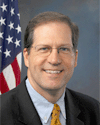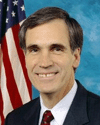The World According to Intrade
If you didn't visit yesterday and are interested in the state-by-state results at Intrade, click on
"Previous report" to the right of the map.
Seven Things to Watch this Fall
Politico has an
article
listing seven questions that could determine who wins the White House. They are:
- Will Obama score big based on the economy?
- Will Palin prove as popular with independents as with the Republican base?
- Can Joe Biden attack Sarah Palin without antagonizing women?
- How will the debates go? Will anyone make a huge mistake?
- Will Hillary Clinton be able to deliver white working class voters? Will she even try?
- Will Rev. Wright come back on stage? What about Charles Keating for that matter?
- Will Mount McCain erupt?
Charlie Cook's Four-Legged Stool
Political Guru Charlie Cook is looking at the election from a
demographic point of view.
His idea is that it is not issues, gaffes or eruptions that matter, but identity politics.
Who do the voters identify with? He says Obama's coalition is like a four-legged stool. To be
stable, he needs all four legs to be solid. With three it might stand but will be shaky. The four
legs are:
- Black voters. He needs 95% of them and a turnout where they are 13-14% of the electorate.
- Hispanic voters. He needs about 70% of them and turnout where they are 5-6% of the electorate.
- Whites under 50, both college and noncollege educated. Under 43% here would be deadly.
- Whites over 50, especially working class whites.
Obama has a decent chance with the first three legs of the stool. The fourth one is the key. If
the older, white, noncollege, working class voters decide that the economy is really broken and they
reminisce about FDR and come back to their traditional Democratic home, Obama wins in a rout. If they
simply don't trust this young whippersnapper (who is also black) and take the "safe" road and vote for
McCain, the election could go either way. McCain has little chance with the first three groups; his hope
lies with convincing older voters that voting for Obama is just too risky.
Sarah Palin Agrees to be Interviewed
With McCain, Obama, and Biden all on the Sunday talk shows yesterday, the Democrats began saying that
Palin was afraid to be interviewed by a serious reporter. To avoid having this charge become an issue itself,
the McCain campaign has backed down and
agreed
to let her be interviewed by ABC's Charles Gibson. Republicans are hoping for a Larry-King-like softball
interview with questions like: "Do you think you have enough experience to be President if the need should arise?"
Democrats are hoping for more hardball questions like: "Do you really believe that if a woman is raped she should
be forced to bear her rapist's child?"
The structure of the interview--taped over a period of several days--is not the way political reporters normally work
because it allows the interviewee to recover from a mistake by saying: "Let's try that one again." The reporter can't
afford to have the interviewee walk off the set, so he is under pressure to be nice. In an interview broadcast
live, there are no holds barred.
Senate Rundown
It's been a long time since we looked at the Senate, so let's do that now.
There are 23 Republican-held seats and 12 Democratic-held seats up for election
this year. First let's look at five Republican seats that the Democrats are likely to win.
For the full story on all 35 races, click on "All senate races" below the map.
Alaska
| Incumbent | Challenger | Notes
Polls |

Ted
Stevens
(R)
|

Mark
Begich
(D)
|
If you Google "The bridge to nowhere" you will find over 100,000 hits, all
of them describing Ted Stevens' pet project of spending $320 million of
the taxpayers money to build a bridge from Revillagigedo Island (pop.
13,950 including Ketchikan) to its airport, to spare its residents a $5
ferry ride. Outside of Alaska he is the poster boy
for pork barrel legislation gone berserk, but within the state he is seen as the
guy who is trying to bring home the bacon.
Stevens will be 91 at the end of his next term, which is bad for such a young state.
In July 2007, the FBI and IRS raided his home as part of a corruption probe.
He was subsequently indicted on seven counts of making false statements on his
Senate financial disclosure forms and will stand trial this Fall.
|
Colorado
| Challenger | Challenger | Notes
Polls |

Bob
Schaffer
(R)
|

Mark
Udall
(D)
|
Sen Wayne Allard (R-CO) is retiring and the Republicans will probably lose his seat.
Colorado has been trending Democratic in
recent years. While George Bush carried the state by 6% in 2004, Colorado
also elected Ken Salazar (D) to the Senate the same year and just elected
Bill Ritter (D) governor by 15%. Furthermore, the Democrats control both
houses of the state legislature. Colorado will be the Democrats' number 1 target
in 2008. Rep. Mark Udall is running for an upgrade to the Senate.
He has a very strong environmental record in this environmentally conscious state.
The Republican is former Rep. Bob Schaffer. Schaffer ran for the Senate in 2004 but lost to
Pete Coors in the Republican primary. Polls show Udall way ahead.
|
New Hampshire
| Incumbent | Challenger | Notes
Polls |

John
Sununu
(R)
|

Jeanne
Shaheen
(D)
|
Sen. John Sununu (R-NH) had not really been on the radar until Nov. 7, 2006, when a political
tsunami hit New Hampshire. Gov. John Lynch (D) was reelected with
the largest margin in state gubernatorial history at the same time two totally unknown Democrats
knocked off the state's two sitting Republican House members.
The Democrats also swept to power in both
houses of the state legislature for the first time since 1874.
In this environment, the rematch between three-time governor Jeanne Shaheen (D) and
Sununu is likely to be very different than Sununu's 2002 4% victory over Shaheen.
Early polling gives Shaheen a double-digit lead.
Sununu has the additional
burden of being a strong supporter of the war in Iraq, a highly unpopular position
in New Hampshire. At this point, the seat leans strongly Democratic.
|
New Mexico
| Challenger | Challenger | Notes
Polls |

Steve
Pearce
(R)
|

Tom
Udall
(D)
|
New Mexico is truly a swing state. In presidential races, it is split right down the
middle. It also has one Democratic senator (Jeff Bingaman) who wins in landslides and
one Republican senator (Pete Domenici) who wins in landslides.
Under normal conditions, Domenici would be a shoo-in for a seventh term, but in Oct.
he announced his retirement due to brain disease.
After a bruising primary, Rep. Steve Pearce won the Republican nomination.
On the Democratic side, Rep. Tom Udall (cousin of Mark in Colorado) is
the candidate.
The NRSC has announced that it won't be spending any money in New Mexico, which means they concede
the seat to Udall.
|
Virginia
| Challenger | Challenger | Notes
Polls |

Jim
Gilmore
(R)
|

Mark
Warner
(D)
|
Sen. John Warner (R-VA) has decided to retire after his term is over in Jan. 2009.
Former governor Mark Warner (D) is the Democratic
nominee. Warner is young, attractive, and made about $200 million as a cell phone
entrepreneur, so he can finance the campaign himself.
The Republican nominee is former governor Jim Gilmore.
Troublesome for the GOP is that the Northern Virginia suburbs,
which are heavily Democratic, are growing rapidly and led to the election of
Jim Webb (D) as senator in 2006 and Tim Kaine (D) as governor in 2005. Warner's
retirement has suddenly made Virginia a very likely Democratic pickup in the
Senate.
|
In addition to those five likely Democratic pickups, there are another five seats that are very competitive.
They could go either way. Here they are.
Maine
| Incumbent | Challenger | Notes
Polls |

Susan
Collins
(R)
|

Tom
Allen
(D)
|
Sen. Susan Collins (R-ME) represents a dying breed: moderate Republicans from the
Northeast. New England used to be run by them, but they have suffered major losses
in recent years. Collins is personally popular, but so was Sen. Lincoln
Chafee (R-RI), and it didn't save him. Also working against
Collins is her 1996 pledge to serve only two terms, something she repeated
in 2002. She recently decided to break that promise and run for a third term.
Her opponent, Rep. Tom Allen from ME-01 (who already represents
half the state in the House).
This seat will be competitive although Collins has the edge.
|
Minnesota
| Incumbent | Challenger | Notes
Polls |

Norm
Coleman
(R)
|

Al
Franken
(D)
|
Sen. Norm Coleman (R-MN)
won his seat in 2002 by a tiny margin after his Democratic opponent, Paul Wellstone,
was killed in a plane crash two weeks before the election. The Democrats hastily
got former Vice President Walter Mondale to take Wellstone's slot on the ticket, but
he wasn't able to jump in and win. Both parties are keenly aware that in Nov. 2006, Hennepin County
Attorney Amy Klobuchar (D) crushed Rep. Mark Kennedy (R) by over 20% for an open
Senate seat.
Comedian Al Franken is the Democratic nominee. Remember, this is a state that elected
a pro wrestler as governor. Franken is good at zingers, which people remember, such as
"I'm the only New York Jew" in this race who actually grew up in Minnesota."
|
Mississippi-B
| Incumbent | Challenger | Notes
Polls |

Roger
Wicker
(R)
|

Ronnie
Musgrove
(D)
|
Sen. Trent Lott's surprise resignation has opened up the other Mississippi Senate seat in 2008.
On Jan. 1, 2008, Gov. Haley Barbour (R) named Rep. Roger Wicker (R) of MS-01 to fill out
the seat until the end of the 110th Congress. Wicker will have to stand for election in
a special election in November. Former Mississippi governor, Ronnie Musgrove (D)
is contesting the seat. Although Mississippi votes Republican for President,
Democrats control both houses of the state legislature. Furthermore,
the incumbent has never won statewide election and the challenger has.
Expected to be quite close.
|
North Carolina
| Incumbent | Challenger | Notes
Polls |

Elizabeth
Dole
(R)
|

Kay
Hagan
(D)
|
Sen. Elizabeth Dole (R-NC) did a spectacularly bad job as head of the NRSC recruiting strong senatorial
candidates in 2006 but probably most
people (except politicians and political junkies) have never even heard of the NRSC.
On the other hand, they have definitely heard from the DSCC which has been running an ad all over the state
showing two old geezers in rocking chairs discussing the fact that Dole ranks 93rd in Senate effectiveness.
Her Democratic opponent is state senator Kay Hagan. Dole was the favorite, but the ad has evened it up.
|
Oregon
| Incumbent | Challenger | Notes
Polls |

Gordon
Smith
(R)
|

Jeff
Merkley
(D)
|
Sen. Gordon Smith (R-OR) is a moderate senator in a state that is fairly Democratic.
Although he won by 16% in 2002, his net approval rating is only 11%.
His opponent, state House speaker Jeff Merkley (D), could run the same
campaign against him that Sen. Sheldon Whitehouse (D-RI) ran against former senator Lincoln
Chafee (R) in Rhode Island: "Smith is a nice guy but do you want Mitch McConnell
to be majority leader?" This seat is definitely a Democratic priority.
|
Finally, we come to the only seat the Democrats might lose, but that seems increasingly unlikely.
Louisiana
| Incumbent | Challenger | Notes
Polls |

Mary
Landrieu
(D)
|

John
Kennedy
(R)
|
Mary Landrieu is one of the two Democrats who barely squeaked by
in 2002, having won in a runoff with 52%. The Republicans have her in their
crosshairs. They might try to blame hurricane Katrina on her (or more
specifically, her response to it), but that would be playing with fire as she would
would likely then blame the Republican administration. Her net approval rating
is +10%--not great--so this is one of the Republicans best chances for a pickup.
Her worst problem is that hundreds of thousands of people, most of them
Democrats, left the state after the hurricane.
Her opponent is state treasurer John Kennedy, who recently switched from the
Democratic party to the Republican party to run against Landrieu.
Landrieu trivia: Her father, Moon Landrieu, was mayor of New Orleans from 1970 to 1978,
and her brother is the current Lt. Governor of Louisiana.
|
All in all, the Democrats are very likely to win Alaska, Colorado, New Hampshire, New Mexico, and Virginia
and have a 50-50 chance in Maine, Minnesota, Mississippi-B, Oregon, and North Carolina. The number of Democratic
pickups will then probably be in the range 6-8. Assuming that Mary Landrieu hangs on in Louisiana, as seems likely,
the Democrats will have 57-59 seats in the new Senate. While this is not enough to break a fillibuster, it puts
them within shooting distance, which means on any individual bill, Harry Reid has to cajole 1-3 Republicans to
vote for cloture. That might be doable sometimes. If McCain is elected President, he will be facing a fairly hostile
Senate and will have to work with the Democrats to get anything done.
The other seats are virtually certain to be won by the incumbent, except Idaho, where retiring Sen. Larry
Craig (R) will almost certainly be replaced by Lt. Gov. Larry Risch (R-ID)
and Nebraska, where retiring Sen. Chuck Hagel (R) will be replaced by Mike Johanns (R).
Here is the list:
Safe Dem: AR (Pryor), DE (Biden), IL (Durbin), IA (Harkin), MA (Kerry), MI (Levin), MT (Baucus), NJ (Lautenberg),
RI (Reed), SD (Johnson), and WV (Rockefeller).
Safe GOP: AL (Sessions), GA (Chambliss), ID (Craig/Risch), KS (Roberts), KY (McConnell), MS-A (Cochran),
NE (Hagel/Johanns), OK (Inhofe), SC (Graham), TN (Alexander), TX (Cornyn), WY-A (Enzi), and Wyoming-B (Barrasso).
Today's Polls
All quiet on the state polling front.
We do have some national polls though. The Rasmussen tracking poll makes it a tie at 46% each.
The Gallup tracking poll puts McCain ahead 48% to 45%. Gallup also ran a poll Friday to Sunday putting
McCain ahead 54% to 44%. Gallup's methodology of running both tracking polls (separate polls on Friday,
Saturday, and Sunday and then averaging the three results) and single polls calling people over three
days and treating it like a single poll is very confusing to say the least. It is not clear why they
are using two different methodologies and it is certainly not clear why they give such different results
(although the first one is registered voters and the second one is likely voters).
In any event, McCain is getting his expected post-convention bump.
The whole concept of a "convention bounce" shows that voters have very short memories. Whatever happened
last dominates. In a week, something else will be in the news and the conventions will be forgotten.
Everyone expects the first debate, at the University of Mississippi on Sept 26, will be a crucial event though.
If you like this Website, tell your friends. You can also share by clicking this button

-- The Votemaster
|
Your donation is greatly appreciated. It will buy ads to publicize the site.

|





















